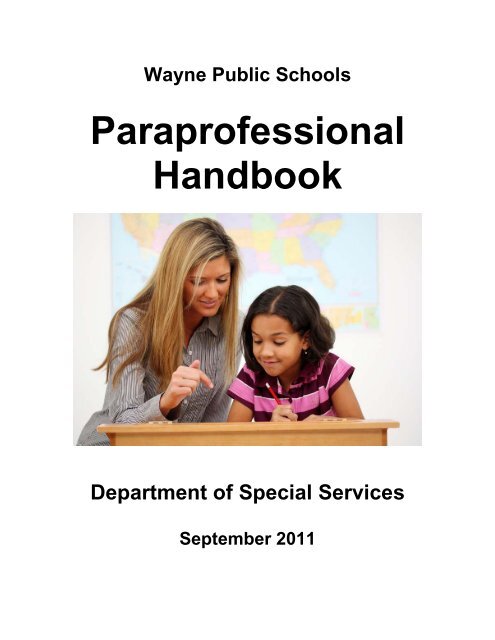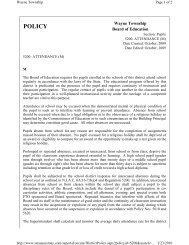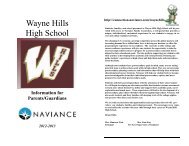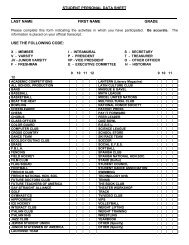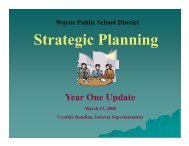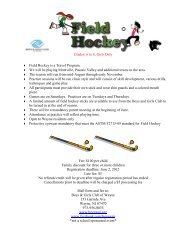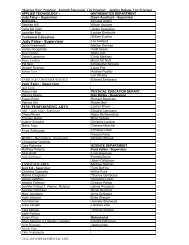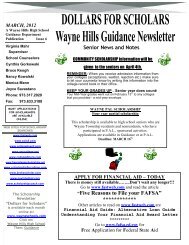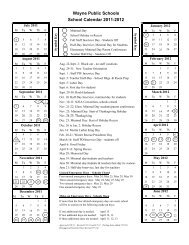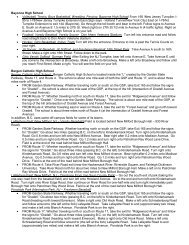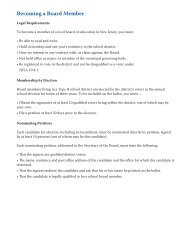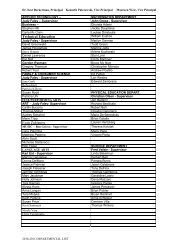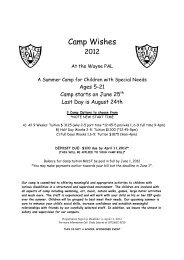Paraprofessional Handbook - Wayne NJ Public Schools
Paraprofessional Handbook - Wayne NJ Public Schools
Paraprofessional Handbook - Wayne NJ Public Schools
Create successful ePaper yourself
Turn your PDF publications into a flip-book with our unique Google optimized e-Paper software.
<strong>Wayne</strong> <strong>Public</strong> <strong>Schools</strong><strong>Paraprofessional</strong><strong>Handbook</strong>Department of Special ServicesSeptember 2011
WAYNE PUBLIC SCHOOLS2011-2012ADMINISTRATION50 Nellis Drive<strong>Wayne</strong>, <strong>NJ</strong>07470Interim Superintendent of <strong>Schools</strong>, Michael Roth …………..……...………... 973-633-3032Director of Elementary Education, Dr. Maryrose Caufield-Sloan ………...…. 973-317-2188Director of Secondary <strong>Schools</strong>, Dr. Cathy A. Labate ………………....……… 973-317-2182Director or Human Resources,Claudia Olivo ……………………..………... 973-317-2131Business Administrator/Board Secretary, Juanita Petty …………….………. 973-633-3006Assistant Business Administrator, Nicole C. Shoening ………………..…..... 973-633-3009DEPARTMENT OF SPECIAL SERVICES1502 Hamburg TurnpikeDirector of Special Services, Dr. Mary Rose Scalo …………………..….……. 973-633-3158Supervisor of Special Services, Elementary <strong>Schools</strong>, Donna Shelichach .. 973-633-3154Supervisor of Special Services, Secondary <strong>Schools</strong>, Linda Melchiorre ….. 973-633-3154HEALTH SERVICESPreakness School1006 Hamburg TurnpikeHealth Services Supervisor, Suzanne Koransky ……….…………..…………. 973-968-7441TRANSPORTATION195 Dey RoadTransportation Supervisor, Darryl Fennell ……………………………...……… 973-633-3120
WAYNEPUBLIC SCHOOLS2011 - 2012ELEMENTARY SCHOOLSRandall Carter ElementaryPrincipal, Kenneth Kaplan531 Alps Road973-633-3145Theunis Day ElementaryPrincipal, Laura Russomano55 Webster Drive973-633-3155Fallon ElementaryPrincipal, Ethan Maayan51 Clifford Drive973-633-3125John F. Kennedy Elem.Principal, Richard Erck1310 Ratzer Road973-633-3160Lafayette ElementaryPrincipal, Stella Cosmas100 Laauwe Ave.973-633-3165Packanack ElementaryPrincipal, Roger Rogalin190 Oakwood Drive973-633-3170Pines Lake ElementaryPrincipal, Pamela Longo511 Pines Lake Drive973-633-3175Ryerson ElementaryPrincipal, Frank Markowick30 McClelland Ave.973-633-3180973-633-3168Albert Payson Terhune El.Principal, Marion McGrath40 Geoffrey Way973-633-3150MIDDLE SCHOOLSAnthony <strong>Wayne</strong> MSPrincipal, Diane Pandolfi201 Garside Ave.973-389-2120George Washington MSPrincipal, Mary Jane Tierney68 Lenox Road973-633-3140Schuyler-Colfax MSInt. Principal, Robert Mitchell1500 Hamburg Turnpike973-633-3130HIGH SCHOOLS<strong>Wayne</strong> Hills HSPrincipal, Scot Beckerman272 Berdan Ave.973-317-2001<strong>Wayne</strong> Valley HSPrincipal, Robert Reis551 Valley Road973-317-2201
OVERVIEWWelcome to the <strong>Wayne</strong>School District where excellence is achieved.The paraprofessional is a highly valued member of the instructional team who workscollaboratively with the certified special and general education teachers, therapists andspecialists who are responsible for the development and provision of the educationprogram mandated by each disabled pupil’s Individualized Education Plan (IEP).The paraprofessional is required to take direction from the certified staff members andto facilitate maximized functioning of each pupil in the classroom and schoolenvironment. Depending upon the specific assignment, the paraprofessional may beexpected to (1) assist all students in a classroom or to provide one-to-one instructionand supervision; (assist with classroom management; (3) provide assistance in acomputer laboratory; and/or (4) provide instructional services to students under thedirect supervision of a teacher. For preschoolers, primary age pupils and significantlydisabled students, the paraprofessional is required to facilitate the development ofindependence in activities of daily living, including feeding, toilet training andambulation, as well as preacademic and academic skills. Duties of the paraprofessionalmay also include assisting and supervising pupils in the cafeteria and/or on theplayground. The safety of our children is our primary concern.Concerns or questions which the paraprofessional may have regarding responsibilities,procedures or pupil functioning or progress should be directed first to the classroomteacher. Additional assistance can be provided by the building administrators,supervisor of special services, and Child Study Team case managers. Communicationwith parents should be provided by the certificated staff member. Questions asked byparents should be directed by the paraprofessional to the teacher, building administratoror case manager.Absences: You are required to contact Ms. Judy Gerasimenko at 973-633-3168 “0” atRyerson School from 8:00 a.m. – 4:00 p.m. or on the answering machine, 633-3164 ext.“101”, from 4:00 p.m. – 6:00 a.m. to report your absence. If there is an emergency,Judy can be reached at her home at 973-696-0390. Please remember to call in yourabsence by 6:00 a.m. as the messages will be retrieved and substitutes obtained.Please give Judy as much pre-advisement as possible. This will maximize theprobability that a substitute can be accessed to cover your position during yourabsence. If you are assigned to a one-to-one position and the pupil you are workingwith is absent, please call Judy at 973-633-3168 “0” immediately for a reassignment forthat day.Resignations: If you are resigning your position, please be cognizant of Article VI,C inthe <strong>Wayne</strong> <strong>Paraprofessional</strong>s’ Association contract which states, “An employee who isresigning from her/his position shall give thirty (30) days notice of their intention toresign from their position.”We welcome you to <strong>Wayne</strong> and look forward to a very successful and rewarding schoolyear.
The children come first! Be flexible – routines change.EXPECTATIONS Limit classroom chatter. Children are easily distracted. Interrupting theteacher during instruction, asking questions, making comments or talkingacross the room should be avoided. Assist with transitions – gather materials, look ahead to what activity isgoing to happen and take initiative to assist. Do not leave the classroom without talking to the teacher. Don’t sit back and wait for the teacher to tell you what to do as this onlymakes more work for the teacher. Be observant and learn what needs tobe done – and do it! Assist with the physical needs of the students when necessary. This mayinclude activities of daily living such as eating, dressing, and toileting. Be professional! Do not speak about children with others who do not deal with them directly.Confidentiality is essential and required. Watch what you say when talking to others in the community (school andtown). Your talk represents you, the classroom and the school. Shareconcerns appropriately and with the personnel involved. Share ideas with the teacher before trying them with the children. You area valued member of the classroom team and it is important that you giveinput, however the teacher is responsible for final decisions and berespectful if he/she cannot use your idea. If you have certain needs to do your job and these needs are not beingaddressed, please make sure to inform your direct supervisor. You must complete all required trainings that are requested of you to fulfillyour job; including but not limited to:• Non-violent Crisis Prevention Intervention• Safety and Security
TEAMING Communicate with the teacher early on about goals/responsibilities Learn each other’s areas of expertise Schedule mutual planning time with the classroom teacher Possible areas to discuss: Evaluation of students Instructional methods to be used in the classroom How to give instructions School and class rules Discipline RoutinesTeams should actively workto create a climate of cooperation
THE TEACHER/PARAPROFESSIONAL TEAMRoles and ResponsibilitiesPLANNINGTeacherCollaborates with CST, parents, thestudent, and other professionals todetermine goals and objectives for thestudent’s IEP.Plans short-term objectives for carrying outIEP goals.<strong>Paraprofessional</strong>Provides appropriate input as related tostudents.Implements plans under the direction ofthe teacher.TEACHINGTeacher<strong>Paraprofessional</strong>Plans daily, weekly, monthly schedules; Follows assigned schedules, assists withdesigns room arrangements, activity room arrangements, activity centers, andcenters, field trips.field trips.Prescribes activities and materials to meet Carries out activities under direction ofIEP goals.teacher.Plans and teaches lessons for entire Reviews material, reinforces lessons,classes, small groups and individual supervises practice of skills as directed bystudents.teacher.ASSESSMENTTeacher<strong>Paraprofessional</strong>Administers formal and informal tests. Administers informal tests.Creates teacher-made tests andImplements adaptations and modifications.determines adaptations and modificationsfor students.Assesses and evaluates student progress. Scores informal tests, under the directionScores tests, evaluates essays and of the teacher, and with the use of answerassigns grades.keys.TeacherObserves student behavior, prescribesbehavioral supports and managementstrategies for individual students as well asfor entire class.BEHAVIOR MANAGEMENT<strong>Paraprofessional</strong>Observes and records behavior, carriesout behavior management activities asdirected by teacher.COLLABORATING WITH PARENTSTeacher<strong>Paraprofessional</strong>Initiates contact with parents. Arrangesconferences concerning student’sprogress. Shares concerns regarding thestudent with his/her parents.Refers parents to teacher when parentsask for information regarding student.
WORKING AS A TEAMTeacher<strong>Paraprofessional</strong>Shares goals and philosophy withShares ideas, concerns, interests withparaeducator.teacher.Provides regular opportunities for staff Participates in staff meetings andcommunication and group discussion. discussion by appropriately sharingconcerns.Actively involves paraprofessionals in Participates in classroom routine.classroom routine.Informs paraprofessional of the goals andobjectives, strategies, accommodationsand modifications provided in the student’sIEP.Trains paraprofessionals in classroomroutine and skills required to performassigned tasks.Assigns tasks to paraprofessionals, beingmindful of individual strengths, interestsand needs.Monitors task performance.Implements strategies, accommodationsand modifications as directed by teacher.Asks for clarification and/or assistance ifassignment is not understood.Shares talents, special interests and skillswith teacher.Demonstrates willingness to listen tosuggestions from teacher. Acceptsdirections from teacher.PERSONAL CARETeacher<strong>Paraprofessional</strong>Identifies personal needs of each student. Accepts training and/or direction fromteacher and other professionals regardingpersonal care of students.Provides necessary personal care. Provides necessary personal care.Assists student in the use of adaptive Assists student in the use of adaptiveequipment.equipment.CLERICAL/CLASSROOM MANAGEMENTTeacher<strong>Paraprofessional</strong>Determines the paraprofessional’s role inclerical/classroom management duties,such as ordering supplies, takingattendance, and copying materials.Maintains files and records as directed byteacherPrepares and organizes materials tosupport teaching and learning.SUPERVISION OF STUDENTSTeacher<strong>Paraprofessional</strong>Informs paraprofessional of other relevant Supervises students in lunchroom,duties involving the supervision ofhallways, on playgrounds.students.Assists in loading and unloading buses.Assists with mobility of students.
General tips to get you started: ReviewSchool’s Safety Procedures Learn Daily Schedule Familiarize yourself with details…parking, mail, lunch,special events, etc. Learn to use copy machines and other equipment Read and sign Student Profile Sheet Read and sign daily <strong>Paraprofessional</strong> AssignmentSheet for student supervision during lunch/recess Meet with the Child Study Team and ClassroomTeacher to discuss student needs and specificresponsibilities
BEHAVIOR MANAGEMENT Model appropriate behavior, language and mannersat all times. Remain calm even when upset or frustrated! Show respect for students, parents, teachers, andadministrators. Be organized – This can prevent problems fromoccurring! Demonstrate self-respect by modeling good healthhabits, grooming, dress, and posture. Never use corporal punishment. Allow the teacher to make classroom rules, setschedules, develop behavior plans, select reinforcers,and evaluate the effectiveness of intervention. Praise good behavior. Collect data relative to student behavior as directedby the classroom teacher, CST or other certifiedschool personnel.
COMMUNICATING AND INTERACTINGWITH STUDENTS Establish a positive relationship with the students(respect, courtesy). Your job is to encourage students rather than tocontrol. When giving directions, use the student’s name andgain the student’s attention appropriately. Speak in a calm manner. Use questions to involve the student and monitorunderstanding. Include examples from the student’s experience whenexplaining something new. Be mindful of safety when physically handling andinteracting with students. Check with the classroomteacher regarding appropriate protocol duringinteractions which involve physical engagement.
SUPERVISION DURING LUNCH AND RECESS Learn the physical layout of the lunchroom and playground,including emergency exit procedures. Maintain close proximity to students under your directsupervision. Know where the student(s), you are assigned to superviseare and what they are doing at all times. Never leave students unattended. When on the playground, frequently scan the perimeter andperform regular “headcounts” to make sure all students inyour charge are accounted for. Lunch and recess are perfect times to facilitate socialinteraction. When appropriate, do not have students withdisabilities sit together at one table. Instead help student’sselect lunch places at which they will feel most comfortableand, at the same time, have increased likelihood ofinteracting with peers. Help students choose the activities they want to do andwhich peers they want to participate. Many students struggle with how to interact with others.They feel they are playing a game in which they do not knowthe rules. If you are working with a child who feels this way,teach him/her the rules explicitly.
CONFIDENTIALITYPARAPROFESSIONAL CONFIDENTIALITYontrol information about the students.nly share information with those who have a need to know and whohave proper authorization.ever discuss school information regarding students while attendingsocial events.orward inquiries regarding students to teachers and supervisorypersonnel, if you are approached for confidential information.nteract with those who inquire in a manner in keeping with yourresponsibilities.on’t discuss student situations in the teacher’s room.xplanations for not discussing a student are easier than explanationsfor confidential information inappropriately divulged.ot sharing is caring.hink about privacy.t’s important that things that happen at school, stay at school.ppropriate information exchange carries with it responsibility.earn how to handle uncomfortable inquiries in positive and courteous,but confidential ways.dentify acceptable ways that people who need to know can accessinformation.reat confidential information as if your job depended on it – it may.ou are part of positive public relations for schools. Confidentiality is acornerstone. Protect it!
CHAIN OF RESPONSIBILITYThe first rule of thumb is to always contact the person thatyou have the concern with. Try to work out the problem.If the person is unwilling to resolve the problem, then workthrough the chain of command until the problem is solved.▼ Person(s) involved▼ Supervising Teacher▼ School Principal▼ Supervisor of Special Services▼ Director of Special Services
PARAPROFESSIONAL SELF ASSESSMENTCommunication: Y NDo I use appropriate and clear language?Do I respond appropriately to difficulties and seeks help from appropriateindividuals?Do I communicate student needs or concerns to appropriate persons?Do I respect confidentiality and demonstrates discretion?Do I communicate appropriately and respectfully with students?Responsiveness to Student Needs: Y NDo I adjust management style in response to student needs, ability levels, andmaturity levels?Do I demonstrate understanding of each target student’s needs, individualizedprogram, and special services?Do I assist in adapting instructional activities and materials according to learnerneeds and individualized program?Do I recognize strengths and abilities of students?Do I foster student independence, socialization, and self-esteem?Do I suggest relevant ideas or changes to student support when appropriate?Do I demonstrate interest and enthusiasm?Do I demonstrate initiative?Do I demonstrate the ability to work independently?Do I demonstrates effective strategies for management of student behavior?Working Relationships: Y NDo I follow written or oral plans and instructions, seeking clarification as needed?Do I demonstrate flexibility to changes in schedules, plans, assignments, and soforth?Do I participate effectively as a team member?Do I respond appropriately to input and direction from teachers and other teammembers?Do I contribute to staff or team meetings (if requested to attend)?Do I maintain composure under pressure?Do I demonstrate proficiency in academic skills, including oral and writtencommunication?Responsibility: Y NDo I follow through on directions and student program requirements?Do I respond appropriately to, and acts on, constructive feedback?Do I adhere to classroom, school, and district policies and procedures?Do I demonstrate punctuality and regular attendance?Do I respond to student needs?Do I move around the class?Do I establish rapport with students?Do I enforce school/classroom rules and routines?Do I show interest and enthusiasm?Do I foster student independence?Do I show initiative?Do I follow directions?
Do I perform specific assigned duties?Am I punctual and do I have consistent attendance?
PARAPROFESSIONAL: POLICIES AND PROCEDURES CHECKLIST1. Have I exchanged telephone numbers with the teacher?2. Have I learned emergency procedures in case of such events as fire orweather emergencies?3. Have I become familiar with the daily classroom schedule?4. Do I understand my job description and responsibilities?5. Do I understand how I am to divide my time among tasks?6. Do I understand the teacher’s discipline methods?7. Do I know in what ways the teacher wants me to assist in discipliningstudents?8. Do I know where supplies are kept?9. Do I know where to obtain equipment?10. Do I know how to operate classroom equipment?
REFERENCESBosco, Mary, and Johnston, Judy (Inclusion Specialists): Paraeducator Training,BergenCounty Special ServicesCauston-Theoharis, Ph.D., Julie: The <strong>Paraprofessional</strong>’s <strong>Handbook</strong> for EffectiveSupport in Inclusive Classrooms, Paul H. Brookes Publishing Company, 2009Gearhart, Kerri (Director of Special Education, Northwest Ohio EducationalServiceCenter): <strong>Paraprofessional</strong> Skills for Success, Powerpoint Presentation,August 13, 2008National Education Association: NEA Paraeducator <strong>Handbook</strong>, 2005New Jersey Department of Education: <strong>Paraprofessional</strong> Regulationswww.state.nj.us/educationStatewide Parents Advocacy Network: <strong>Paraprofessional</strong>s: Understanding TheirSupporting Roles, Powerpoint Presentation for <strong>Wayne</strong><strong>Public</strong> <strong>Schools</strong>, October12, 2009


